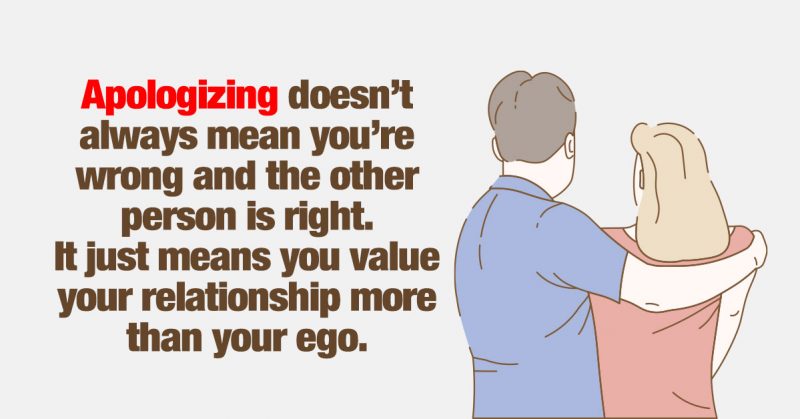One definition of the word ‘apology’ is, “a regretful acknowledgment of an offense or failure.” Normally, you are supposed to apologize to someone when you’ve done something wrong or hurtful, whether you intended to or not. An apology never shows weakness but it’s a sign of decency. It’s also the first step to atoning for your mistakes and is only genuine when you follow it up with a solid attempt to fix your erring character. It may only just be a few words, but a good apology also helps the person you’ve hurt with their healing process.
However, this definition limits the scope of when a person can apologize. Sometimes, when quarrels and conflicts threaten the future of our relationships and connections, it might be the better option to just apologize to the other person and let things go. While it doesn’t rule you as wrong or declare the other person right, it could be the wiser thing to do to preserve your relationship.
It doesn’t mean you are admitting a mistake or devaluing your pride. It simply means that you value whatever you share with this person or group of people too deeply to let a misunderstanding bring things to an unnecessary end.
Forget the “bigger person” ideology
When an apology is made in this sense, it’s best not to consider yourself the “bigger person”. Accepting that term will often sow seeds of a grudge and will never allow you to completely let things go. It creates a rift and somehow, instead of filling it with soil, it covers it with a blanket. Get the point? It’s unsafe.
If you apologize to a person when you’ve done no wrong, ensure you’re doing it totally out of love and good intentions. Make sure the words you utter come from a purely genuine desire to keep what you have with this person from hitting the rocks. You don’t have to expressly mention your motive. You don’t need to say something in the likes of, “I’ve done nothing wrong, but let me just apologize so we can move forward.” Mentioning our intention defeats the whole point of the apology.
In reality, the other person should heavily feel the impact of your noble gesture when you extend an olive branch. A wise person knows when they’ve done wrong even if they are unwilling to admit it – or accept it.
It endears you to people and solidifies relationships when you’re willing to cast every sense of pride aside and apologize for something you’re not responsible for. It consolidates your relationships and lets the other person know how much you value them.
There should be a limit
While it’s all right to occasionally choose peace and apologize unnecessarily, you can’t make a habit of doing it all the time. People tend to take advantage of such gestures and you should call the other person out if they’ve made it a habit to never own up to their wrongdoings.
Excessively apologizing when you are not wrong can severely lower your self-esteem and decrease your worth in the eyes of other people. It could also make you seem desperate and easy to manipulate. It’s best to step in front of this situation before it gets out of hand. This use of an apology should work to improve the other person’s character and not degrade it further.
The opinions expressed in this article are those of the author. They do not purport to reflect the opinions or views of this website or its members. The information contained in this article and the presentation of material therein does not imply the expression of any opinion whatsoever on the part of this website.

